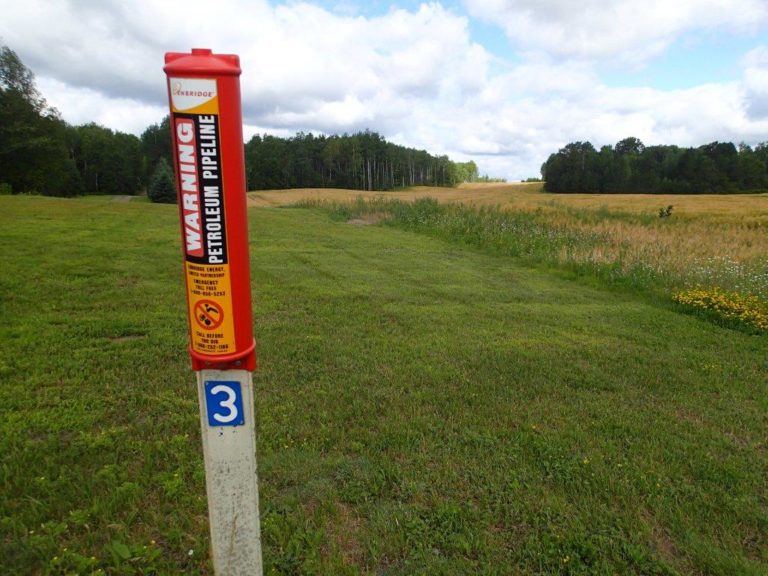
By Matt Doll, Minnesota Environmental Partnership
On Wednesday, August 29, more than 100 people gathered in Bemidji and occupied several streets to share a message: the Enbridge Line 3 pipeline project is wrong for Minnesota. The gathering, organized by MEP partners including MN350, Honor the Earth, and the Sierra Club North Star Chapter, peacefully occupied public streets within a few hundred feet of the headwaters of the Mississippi River. The demonstrators called on Governor Mark Dayton and the state of Minnesota to halt the Line 3 permitting process as lawsuits and challenges to the risky project move forward. They decried the Public Utilities Commission’s approval in June of a certificate of need for Line 3 – a decision that faces legal challenges from multiple groups.
While no arrests were made, local police cited more than 25 people during the protest. According to Sierra Club North Star Chapter Executive Director Margaret Levin, the Bemidji gathering represents only the third time that Sierra Club leadership has gathered in protest at risk of arrest. The rarity of this action underscores the tremendous hazard that Line 3 poses to all Minnesotans, and the often misunderstood fact that the Line 3 debate hasn’t ended – not by a long shot.
The risk to Minnesota’s people and water
The new Line 3, billed as a simple replacement project by Enbridge Energy, would greatly increase the volume of tar sands oil crossing Minnesota’s lands and waters from Kittson County to Duluth. That would impact all Minnesotans financially (see our fact sheet on why Line 3 would be a risky, unneeded investment for our state) and via climate change, as tar sands oil is even more emissions-heavy than conventional crude.
Northern Minnesotans, however, would face the brunt of the impacts. Line 3 would traverse a new route through Minnesota’s most vulnerable and pristine waters, at the top of the continental divide. A spill in those waters would be catastrophic in the short and long term – once tar sands oil spills into water, it’s nearly impossible to clean up. That’s one major reason why the pipeline would be especially harmful to indigenous tribes in Minnesota. The Ojibwe maintain treaty rights to harvest wild rice and fish in Northern Minnesota waters, and deeply rely on these water resources culturally and economically.
Line 3’s approval is not yet set in stone
The Public Utilities Commission did not end the Line 3 debate, as federal, state, and local permits are also required for the pipeline to move forward. And the PUC’s process had clear flaws, rejecting vital testimony and ignoring many of the environmental and cultural impacts a new pipeline would inflict. MEP partners including Honor the Earth and Friends of the Headwaters have filed suit to challenge Line 3’s flawed environmental impact statement, which the PUC relied on in making its decision.
Wednesday’s peaceful rally in Bemidji represents the undaunted willingness of Minnesotans to continue standing up for our land, our waters, our health, and the rights of indigenous communities. We thank all those who took action in Bemidji, and we call on state decision-makers to listen to Minnesotans and avoid the consequences of this harmful new pipeline proposal.